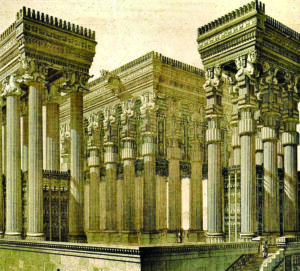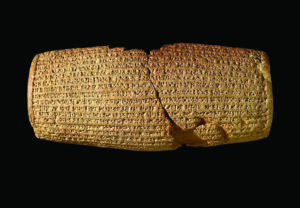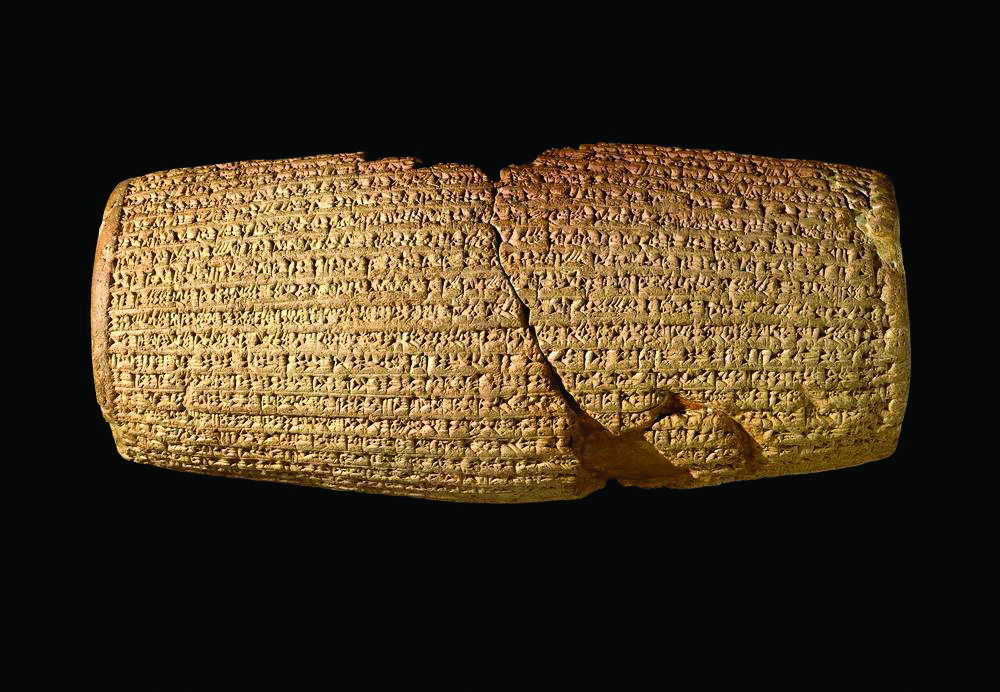 Did you know that it was ancient Iran (Persia or Pars), under the Achaemenian kings, which, more than two and a half millennia ago, gave to this world its first Bill of Human Rights, the world’s first international highway, prototype to the Suez Canal, postal system and even the document that we know today as passport.
Did you know that it was ancient Iran (Persia or Pars), under the Achaemenian kings, which, more than two and a half millennia ago, gave to this world its first Bill of Human Rights, the world’s first international highway, prototype to the Suez Canal, postal system and even the document that we know today as passport.
Tax And Military Reforms:
Persians gave to the world several pioneering concepts including tax reforms (Cyrus the Great decreed that taxes should not be paid to the monarch but paid to the empire’s treasury to be used for public works) and military reforms (Cyrus the Great instituted the system of ten soldiers constituting a company; ten companies making a battalion; ten battalions making a division and ten divisions making a corps). Different army units were identified by different colored uniforms (purple, yellow, blue).
The core troop was called ‘the ten thousand immortals’ and so named because any loss of soldier/s in the troop was immediately replaced, to keep the number constant at ten thousand. The immortals largely comprised young and highly skilled Persians, Medes, and Elamites soldiers under the direct leadership of the Hazarapat, or Commander-in-chief.
Birthdays And Desserts:
It is believed that Persians were among the first to celebrate birthdays with feasting. It started with celebrating only the monarch’s birthday, but later governors, nobles and finally commoners also started celebrating their birthday. The idea that was sparked off in Persia also caught the imagination of the people in other nations of that era.
What’s more, the concept of enjoying desserts after a meal is also a Persian invention which started with something sweet for the king to relish on his birthday but later turned into a daily habit. Now we know where the proverbial Parsi sweet tooth and craving for custard, jelly or other sweet dishes after meals, comes from!
Paradise On Earth:
Gardening was very dear to the Persians. Cyrus the Great used to spend a lot of time in his private garden, at Pasargade (near modern Shiraz), before attending to the business of running his empire. These gardens were lush and fragrant, where one could relax and reflect on matters of State importance. The buildings around Persepolis also had gardens. The Persians called their gardens pairi-daeza, from which the term paradise was later coined.
Law Givers:
The Persian Kings of the Achaemenid dynasty were great visionaries and pioneers. Historians refer to Kurush II, more popularly known as Cyrus the Great, as “the most outstanding person of the ancient world” and architect of the first “World Empire”. His empire was so vast that it took two years to travel from one end of his kingdom to the other, on horseback. What an amazing administrative set-up it must have been, in an age without cellphones or the internet! ‘Law and order’ meant strict observance of the rules by the high and low within the empire, giving rise to the phrase, “The laws of the Medes and the Persians” (Daniel VI, 8), or laws that were immutable.
Bill Of Human Rights:
In an age seeped in cruelty and the law of ‘might is right’, Cyrus gave humanity the first Charter or Bill of Human Rights, declaring, among other rights and freedom, man’s right to freedom of creed, expression and free movement.
The cuneiform inscription on the famous Cyrus cylinder is translated into all six official languages of the United Nations and its provisions parallel the first four Articles of the Universal Declaration of Human Rights i.e., Right to Equality, Freedom from Discrimination, Right to Life, Liberty, Personal Security and Freedom from Slavery.
Governance:
The empire of Darius the Great stretched from the river Danube (Europe) in the west, right up to Sind and the present-day Frontier Province and part of the Punjab and from Central Asia right up to the north-eastern parts of Africa. For administrative purposes, the empire was divided into various satrapies, or a provincial government, who’s Satrap or governors were appointed by the King himself and were directly responsible to him for civil administration, justice, finance, law and order.
Highway And Waterway:
Darius built roads, bridges, and waterways to reach far-flung parts of his empire. The royal highway from Susa to Sardis was about 1700 miles along with 107 post-houses and fine caravansaries. Darius is credited with pioneering the world’s first postal service. It is said, the journey from Susa to Sardis would take ninety days on foot, and three more days to reach to the Mediterranean coast at Ephesus. The journey on horseback would be much faster especially using the relay system of change of horse and horsemen at various stations along the highway.
 Writes Herodotus, in ‘The Histories’ Book 8, Chapter 98, cited in Colburn and translated by R. Waterfield: “There is nothing mortal that is faster than the system that the Persians have devised for sending messages. Apparently, they have horses and men posted at intervals along the route, the same number in total as the overall length in days of the journey, with a fresh horse and rider for every day of travel. Whatever the conditions – it may be snowing, raining, blazing hot, or dark – they never fail to complete their assigned journey in the fastest possible time. The first man passes his instructions on to the second, the second to the third, and so on.”
Writes Herodotus, in ‘The Histories’ Book 8, Chapter 98, cited in Colburn and translated by R. Waterfield: “There is nothing mortal that is faster than the system that the Persians have devised for sending messages. Apparently, they have horses and men posted at intervals along the route, the same number in total as the overall length in days of the journey, with a fresh horse and rider for every day of travel. Whatever the conditions – it may be snowing, raining, blazing hot, or dark – they never fail to complete their assigned journey in the fastest possible time. The first man passes his instructions on to the second, the second to the third, and so on.”
Darius is also credited to have built the prototype of the Suez Canal connecting the Red Sea with the Mediterranean. The famous Suez inscription written in Persian, Elamite and Babylonian reads: “King Darius says, I am a Persian; setting out from Persia I conquered Egypt. I ordered to dig this canal from the river that is called Nile and flows in Egypt, to the sea that begins in Persia. Therefore, when this canal had been dug as I had ordered, ships went from Egypt through this canal to Persia, as I had intended.”
Later, Darius’ son and successor, Xerxes the Great, created the longest ‘pontoon bridge’ across the Hellespont for his 480 BCE invasion of Greece.
Passport:
A passport is a document, issued by a national government certifying identity and nationality of its holder for the purpose of foreign travel. This document generally includes information such as the holder’s name, date of birth, gender, place of birth and photograph. One of the earliest references to passports is found in the Biblical book of Nehemiah, circa 450 BC. Nehemiah, an official serving King Artaxerxes I of Persia, asked leave to travel to Judea. The king gave a letter addressed “to the governors beyond the river”, requesting a safe passage.
- Why Pray In A Language We Do Not Understand? - 29 March2025
- Celebrate Nature’s New Year With Purity And Piety of Ava - 22 March2025
- Celebrate Navruz 2025 With The Spirit Of Excellence And Wholesomeness - 15 March2025
